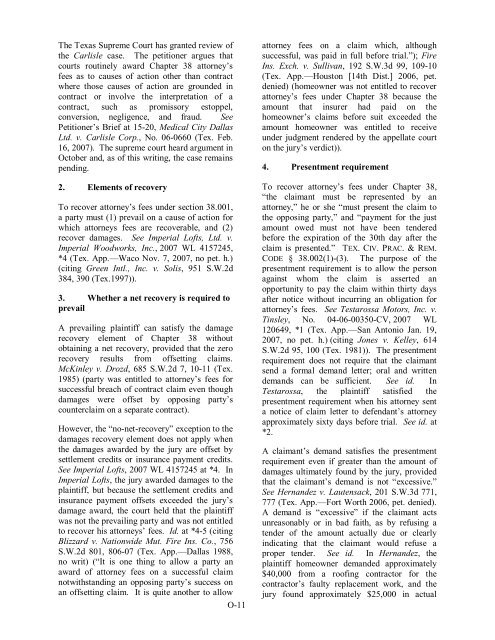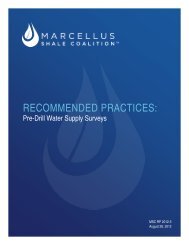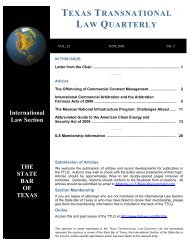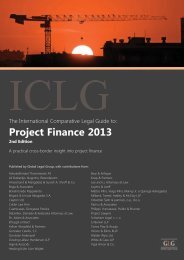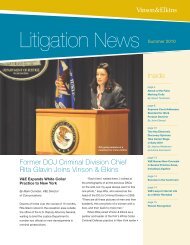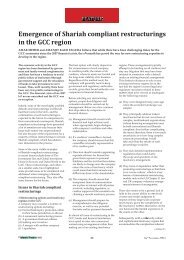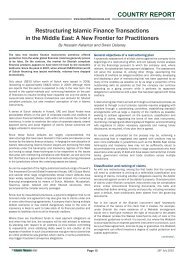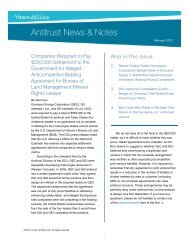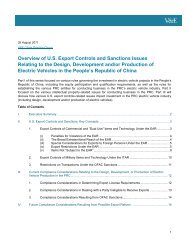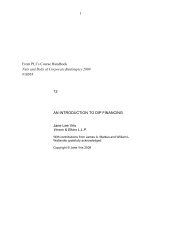Attorney's Fees Update - Vinson & Elkins LLP
Attorney's Fees Update - Vinson & Elkins LLP
Attorney's Fees Update - Vinson & Elkins LLP
You also want an ePaper? Increase the reach of your titles
YUMPU automatically turns print PDFs into web optimized ePapers that Google loves.
The Texas Supreme Court has granted review of<br />
the Carlisle case. The petitioner argues that<br />
courts routinely award Chapter 38 attorney’s<br />
fees as to causes of action other than contract<br />
where those causes of action are grounded in<br />
contract or involve the interpretation of a<br />
contract, such as promissory estoppel,<br />
conversion, negligence, and fraud. See<br />
Petitioner’s Brief at 15-20, Medical City Dallas<br />
Ltd. v. Carlisle Corp., No. 06-0660 (Tex. Feb.<br />
16, 2007). The supreme court heard argument in<br />
October and, as of this writing, the case remains<br />
pending.<br />
2. Elements of recovery<br />
To recover attorney’s fees under section 38.001,<br />
a party must (1) prevail on a cause of action for<br />
which attorneys fees are recoverable, and (2)<br />
recover damages. See Imperial Lofts, Ltd. v.<br />
Imperial Woodworks, Inc., 2007 WL 4157245,<br />
*4 (Tex. App.—Waco Nov. 7, 2007, no pet. h.)<br />
(citing Green Intl., Inc. v. Solis, 951 S.W.2d<br />
384, 390 (Tex.1997)).<br />
3. Whether a net recovery is required to<br />
prevail<br />
A prevailing plaintiff can satisfy the damage<br />
recovery element of Chapter 38 without<br />
obtaining a net recovery, provided that the zero<br />
recovery results from offsetting claims.<br />
McKinley v. Drozd, 685 S.W.2d 7, 10-11 (Tex.<br />
1985) (party was entitled to attorney’s fees for<br />
successful breach of contract claim even though<br />
damages were offset by opposing party’s<br />
counterclaim on a separate contract).<br />
However, the “no-net-recovery” exception to the<br />
damages recovery element does not apply when<br />
the damages awarded by the jury are offset by<br />
settlement credits or insurance payment credits.<br />
See Imperial Lofts, 2007 WL 4157245 at *4. In<br />
Imperial Lofts, the jury awarded damages to the<br />
plaintiff, but because the settlement credits and<br />
insurance payment offsets exceeded the jury’s<br />
damage award, the court held that the plaintiff<br />
was not the prevailing party and was not entitled<br />
to recover his attorneys’ fees. Id. at *4-5 (citing<br />
Blizzard v. Nationwide Mut. Fire Ins. Co., 756<br />
S.W.2d 801, 806-07 (Tex. App.—Dallas 1988,<br />
no writ) (“It is one thing to allow a party an<br />
award of attorney fees on a successful claim<br />
notwithstanding an opposing party’s success on<br />
an offsetting claim. It is quite another to allow<br />
O-11<br />
attorney fees on a claim which, although<br />
successful, was paid in full before trial.”); Fire<br />
Ins. Exch. v. Sullivan, 192 S.W.3d 99, 109-10<br />
(Tex. App.—Houston [14th Dist.] 2006, pet.<br />
denied) (homeowner was not entitled to recover<br />
attorney’s fees under Chapter 38 because the<br />
amount that insurer had paid on the<br />
homeowner’s claims before suit exceeded the<br />
amount homeowner was entitled to receive<br />
under judgment rendered by the appellate court<br />
on the jury’s verdict)).<br />
4. Presentment requirement<br />
To recover attorney’s fees under Chapter 38,<br />
“the claimant must be represented by an<br />
attorney,” he or she “must present the claim to<br />
the opposing party,” and “payment for the just<br />
amount owed must not have been tendered<br />
before the expiration of the 30th day after the<br />
claim is presented.” TEX. CIV. PRAC. & REM.<br />
CODE § 38.002(1)-(3). The purpose of the<br />
presentment requirement is to allow the person<br />
against whom the claim is asserted an<br />
opportunity to pay the claim within thirty days<br />
after notice without incurring an obligation for<br />
attorney’s fees. See Testarossa Motors, Inc. v.<br />
Tinsley, No. 04-06-00350-CV, 2007 WL<br />
120649, *1 (Tex. App.—San Antonio Jan. 19,<br />
2007, no pet. h.) (citing Jones v. Kelley, 614<br />
S.W.2d 95, 100 (Tex. 1981)). The presentment<br />
requirement does not require that the claimant<br />
send a formal demand letter; oral and written<br />
demands can be sufficient. See id. In<br />
Testarossa, the plaintiff satisfied the<br />
presentment requirement when his attorney sent<br />
a notice of claim letter to defendant’s attorney<br />
approximately sixty days before trial. See id. at<br />
*2.<br />
A claimant’s demand satisfies the presentment<br />
requirement even if greater than the amount of<br />
damages ultimately found by the jury, provided<br />
that the claimant’s demand is not “excessive.”<br />
See Hernandez v. Lautensack, 201 S.W.3d 771,<br />
777 (Tex. App.—Fort Worth 2006, pet. denied).<br />
A demand is “excessive” if the claimant acts<br />
unreasonably or in bad faith, as by refusing a<br />
tender of the amount actually due or clearly<br />
indicating that the claimant would refuse a<br />
proper tender. See id. In Hernandez, the<br />
plaintiff homeowner demanded approximately<br />
$40,000 from a roofing contractor for the<br />
contractor’s faulty replacement work, and the<br />
jury found approximately $25,000 in actual


